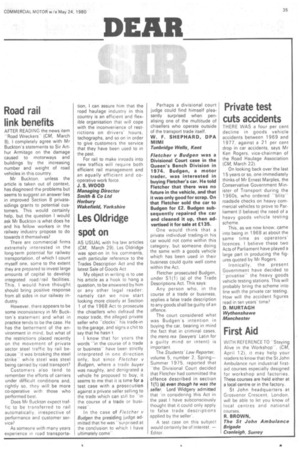Les Oldridge spot on
Page 37

If you've noticed an error in this article please click here to report it so we can fix it.
AS USUAL with his law articles (CM, March 29), Les Oldridge was spot-on in his comments, with particular reference to the Trades Description Act and the latest Sale of Goods Act.
My object in writing is to use his article as a hook to hang a question, to be answered by him or any other legal reader: namely can we now start looking more closely at Section 1 of the 1 968 Act to prosecute • the chisellers who defraud the motor trade, the alleged private seller who "clocks" his trade-in to the garage, and signs a chit to say that he hasn't.
I know that for years the words "in the course of a trade or business" have been strictly interpreted in one direction only, but since Fletcher v Budgen, where a trade buyer was naughty, and denigrated a vehicle he proposed to buy, it seems to me that it is time for a test case with a prosecution against a private seller selling to the trade which can still be "in the course of a trade or business.
In the case of Fletcher v Budgen the presiding judge admitted that he was "surprised at the conclusion to which I have ultimately come''.
Perhaps a divisional court judge could find himself pleasantly surprised when penalising one of the multitude of chisellers who operate outside of the transport trade itself.
W. F. SHEPHARD, DPA MIMI Tunbridge Wells, Kent
Fletcher v Budgen was a Divisional Court case in the Queen's Bench Division in 1974. Budgen, a motor trader, was interested in buying Fletcher's car. He told Fletcher that there was no future in the vehicle, and that it was only good for scrap. On that Fletcher sold the car to Budgen for £2. Budgen subsequently repaired the car and cleaned it up, then advertised it for sale at £135. .
One would think that a private individual trading-in his car would not come within this category, but someone doing the same with a goods vehicle which has been used in their business could quite well come within the Act.
Fletcher prosecuted Budgen, under S1(1) (a) of the Trade Descriptions Act. This says: Any person who, in the course of a trade or business, applies a false trade description to any goods shall be guilty of an offence.
The court considered what was Budgen's intention in buying the car, bearing in mind the fact that in criminal cases, the mens rea (lawyers' Latin for a guilty mind or intent) is important.
The Students' Law Reporter, volume 5, number 2, Spring— Summer 1975, reported that "the Divisional Court decided that Fletcher had committed the offence described in section 1(1)(a) even though he was the seller. Lord Widgery admitted that 'in considering this Act in the past I have subconsciously thought that it could only apply to false trade descriptions applied by the seller'.
A test case on this subject would certainly beat interest. — Editor.
































































































































